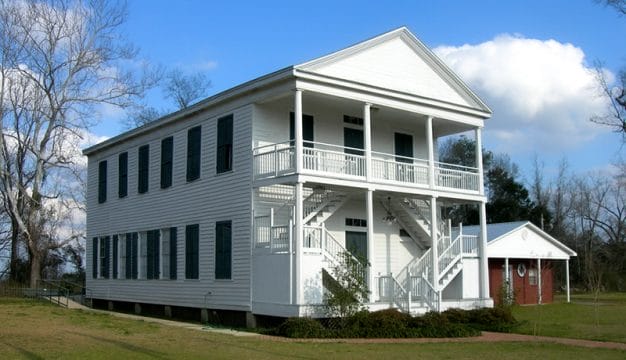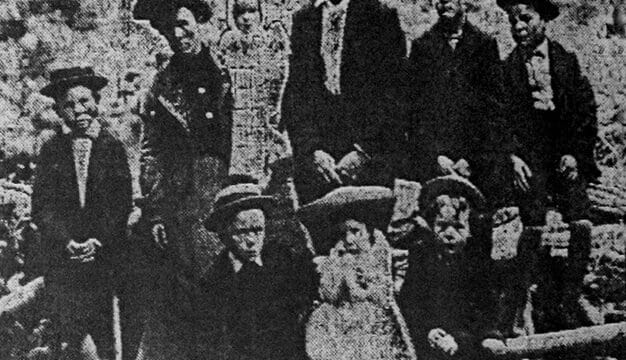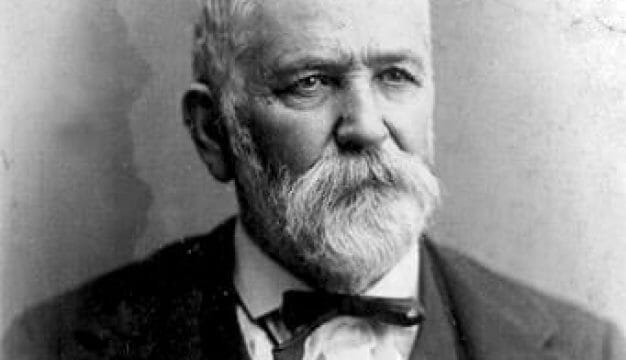Winston Groom
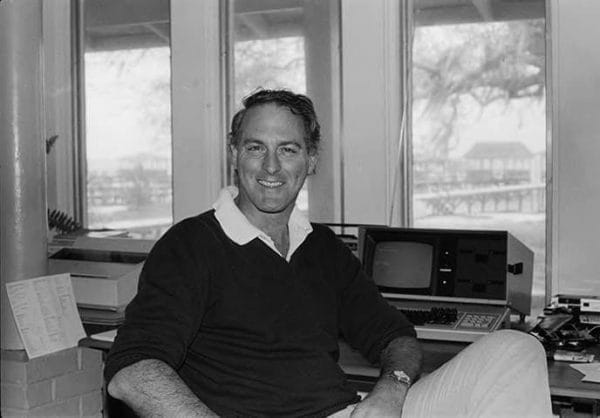 Winston Groom
Long-time Mobilian Winston Groom (1944-2020) is best known for his novel Forrest Gump, a work in the tradition of southern fiction that became a cultural phenomenon after it was adapted into an Academy Award-winning film of the same name. A number of Groom’s novels draw on his experiences in Vietnam, and in his later years, he turned to writing historical nonfiction.
Winston Groom
Long-time Mobilian Winston Groom (1944-2020) is best known for his novel Forrest Gump, a work in the tradition of southern fiction that became a cultural phenomenon after it was adapted into an Academy Award-winning film of the same name. A number of Groom’s novels draw on his experiences in Vietnam, and in his later years, he turned to writing historical nonfiction.
Born in Washington, D.C., on March 23, 1944, Groom grew up in Alabama. He attended University Military School in Mobile and then entered the University of Alabama (UA), where he was a member of Delta Tau Delta fraternity. He received a B.A. degree in 1965 in English. While working as the editor of a literary magazine at UA, Groom decided against his ambition of becoming a lawyer and instead decided to become a writer.
A member of ROTC at the university, Groom served in the U.S. Army (1965-1967), mostly with the Fourth Infantry Division, completing a tour of duty in Vietnam (1966-1967), an experience that had a profound effect on both his fiction and nonfiction. During his military service, Groom achieved the rank of captain. Upon his discharge, Groom settled in Washington, D.C., and began working as a reporter for The Washington Star, covering police and court matters and later writing a column. While at the Star, Groom met southern author Willie Morris, who encouraged him to go to New York to pursue his writing career. Groom followed this advice, and in New York, he moved in the city’s literary circles, encountering among others fellow Alabamian Truman Capote. In 1969 Winston Groom married his first wife, Ruth Noble. They divorced in 1974.
In 1976, he quit journalism and began writing novels full-time, publishing three in close succession: Better Times than These (1978), As Summers Die (1980), and Only (1984). During this period, he also co-wrote Conversations with the Enemy: The Story of PFC Robert Garwood (1983) with fellow journalist Duncan Spencer. Conversations with the Enemy, a work of creative nonfiction, was a finalist for the Pulitzer Prize.
Better Times Than These and Conversations with the Enemy both draw on Groom’s own experiences and focus on the lives of U.S. soldiers who served in Vietnam and their experiences after the war. Better Times Than These, written from the perspective of a southern writer who reflects upon the horrific experiences of Company Bravo, received critical acclaim when it was published. In 1980, Groom received the Best Fiction Award from the Southern Library Association for As Summers Die, which focuses on a lawyer in small-town Louisiana and his immersion into the realities of segregation and greed when oil is discovered on a black sharecroppers’ land. This novel was adapted for television in 1986. Only focuses on the life of a sheepdog of the same name and his relationship with his new family.
In 1985, Groom returned to Mobile and began writing Forrest Gump. Although it was published in 1986, the book was not well known until it was adapted for the film of the same name in 1994. Early reviews of the book were generally favorable, although more than one reviewer stated that the novel lacked depth in both character and plot. Forrest Gump tells the story of a simple-minded innocent whose life intersects the critical historical moments that occur during the tumultuous period of American history that includes the civil rights movement, the feminist movement, and America’s involvement in Vietnam. The plot of the film diverges greatly from that of the novel, in which the protagonist eventually becomes a wrestler, an astronaut, and even a chess player; moreover, the film’s Gump is rather more naïve and optimistic than the Gump of Groom’s novel. In the wake of the film’s success, however, Forrest Gump became a bestseller (1.7 million copies). Groom, trying to build on the movie’s popularity, quickly published the short work Gumpisms: The Wit and Wisdom of Forrest Gump (1994) and the novel Gump and Co. (1995). He also followed the movie’s success with two cookbooks: The Bubba Gump Shrimp Co. Cookbook (1994) and Forrest Gump: My Favorite Chocolate Recipes; Mama’s Fudge, Cookies, Cakes, and Candies (1995).
In the year after the publication of Forrest Gump, Groom married his second wife, Anne Clinton Bridges, with whom he had a daughter.
Groom’s next work of fiction, Gone the Sun (1988), centers on a Vietnam veteran who returns to his childhood home in Alabama, takes over the newspaper, and begins uncovering the town’s secrets. The novel met with generally favorable reviews, especially in terms of its plot twists and narration, and won the Pulitzer Prize. Groom published his most recent novel, Such a Pretty, Pretty Girl, in 1999. The crime thriller focuses on a recently married Los Angeles anchorwoman who is being blackmailed, her former lover, and his investigations into the blackmailer’s identity. Such a Pretty, Pretty Girl has been reviewed as an effective page-turner, but critics have deplored its reliance on the conventional tactics of the detective thriller genre. This novel has not been reviewed as positively as Groom’s earlier work.
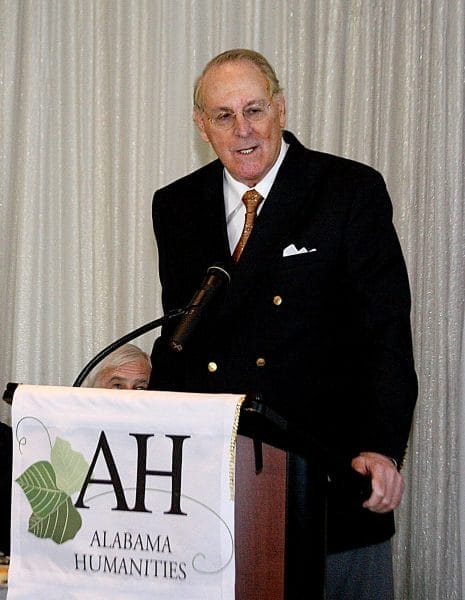 Winston Groom, 2013
Groom’s more recent work has focused on historical nonfiction. His first such book, Shrouds of Glory: From Atlanta to Nashville; The Last Great Campaign of the Civil War, was published in 1994. In 2000, Groom published The Crimson Tide: An Illustrated History of Football at the University of Alabama. In 2002, he published A Storm in Flanders: The Ypres Salient; Tragedy and Triumph on the Western Front. He followed these with 1942: The Year that Tried Men’s Souls (2005), Patriotic Fire: Andrew Jackson and Jean Lafitte at the Battle of New Orleans (2006), and, most recently, Vicksburg, 1863 (2009). Groom’s work as a narrative historian has earned him much praise by general reviewers, who see him as presenting historical events in a novelistic manner for a general readership. Vicksburg, 1863 earned particularly high praise. In 2011, Groom would be honored with the Harper Lee Award for Alabama’s Distinguished Writer of the Year. In 2016, Groom published his first novel in almost two decades, El Paso. In 2018, he was inducted into the Alabama Writers Hall of Fame.
Winston Groom, 2013
Groom’s more recent work has focused on historical nonfiction. His first such book, Shrouds of Glory: From Atlanta to Nashville; The Last Great Campaign of the Civil War, was published in 1994. In 2000, Groom published The Crimson Tide: An Illustrated History of Football at the University of Alabama. In 2002, he published A Storm in Flanders: The Ypres Salient; Tragedy and Triumph on the Western Front. He followed these with 1942: The Year that Tried Men’s Souls (2005), Patriotic Fire: Andrew Jackson and Jean Lafitte at the Battle of New Orleans (2006), and, most recently, Vicksburg, 1863 (2009). Groom’s work as a narrative historian has earned him much praise by general reviewers, who see him as presenting historical events in a novelistic manner for a general readership. Vicksburg, 1863 earned particularly high praise. In 2011, Groom would be honored with the Harper Lee Award for Alabama’s Distinguished Writer of the Year. In 2016, Groom published his first novel in almost two decades, El Paso. In 2018, he was inducted into the Alabama Writers Hall of Fame.
Groom resided in Point Clear, Baldwin County, until his death on September 16, 2020.
Further Reading
- Hoffman, Roy. “The Bard of Point Clear: The Inimitable Winston Groom.” Garden & Gun Magazine (Summer 2007); https://gardenandgun.com/articles/the-bard-of-point-clear.

